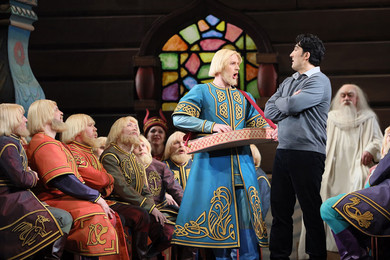Main Stage
Performed in Russian (The performances wiil have synchronised English supertitles) The performance has 2 intermissions Sadko is an opera in seven scenes by Nikolai Rimsky-Korsakov. The libretto was written by the composer, with assistance from Vladimir Belsky, Vladimir Stasov, and others. Rimsky-Korsakov was first inspired by the bylina of Sadko in 1867, when he completed a tone poem on the subject, his Op. 5. After finishing his second revision of this work in 1891, he decided to turn it into a dramatic work. The music is highly evocative, and Rimsky-Korsakov's famed powers of orchestration are abundantly evident throughout the score. According to the Soviet critic Boris Asafyev, writing in 1922, Sadko constitutes the summit of Rimsky-Korsakov's craft. From the opus 5 tone poem the composer quoted its most memorable passages, including the opening theme of the swelling sea, and other themes as leitmotives – he himself set out to "utilize for this opera the material of my symphonic poem, and, in any event, to make use of its motives as leading motives for the opera". Performance history The composer was closely involved in the "assiduous" rehearsals, and he "drilled the orchestra with great care, together with [the conductor] Esposito who proved a very fair musician". Rimsky also corrected errors in the score and worked hard with the chorus. Apart from the Sea-King singer "whom I could not endure" he approved of all the solo singers and singled out Zabyela, who "sang magnificently" and Syekar-Rozhanski. The world premiere took place on 7 January 1898 (O.S. 26 December 1897), presented by the Russian Private Opera at the Solodovnikov Theatre in Moscow. Its conductor was Eugenio Esposito, the brother of Michele Esposito, with scenic designers Konstantin Korovin and Sergey Malyutin. The production was financed by the railway tycoon Savva Mamontov; this was the first time that one of Rimsky-Korsakov's operas was staged by a commercial theatre rather than the Imperial Theatres. The St. Petersburg premiere followed 26 January 1901 at the Mariinsky Theatre, conducted by Eduard Nápravník, with scenic design by Apollinary Vasnetsov. In 1906, the opera was presented at the Bolshoi Theatre in Moscow conducted by Vyacheslav Suk, with scenic design by Konstantin Korovin. The first US performance occurred at the Metropolitan Opera in New York on 25 January 1930 in French with Tullio Serafin, followed a year later by the first performance in London in June 1931. A truncated production was mounted in Monte Carlo in 1921, conducted by Victor de Sabata, with Dimitri Smirnov in the title role. Revivals took place at the Bolshoi in 1935, 1949 and 1963. A production at the Berlin Staatsoper in 1947 featured Ludwig Suthaus, Erna Berger and Margarete Klose. Aleksandr Ptushko directed a film of the opera in 1952 with the music but without singing. A new production by Alexei Stepaniuk for the Mariinsky Theatre in 1993 was later toured to Paris (Théâtre des Champs-Élysées) and recorded. Sadko is rarely performed today outside the Russian Federation. However there was a new production in Amsterdam (2017), and one is scheduled for Bratislava (2018). Also in 2018, a rare U.S. series of performances is scheduled for March in Silver Spring, Maryland. Sung in Russian with English supertitles, the production is produced by Bel Cantanti Opera Company, led by BCO artistic director Dr. Katerina Souvorova in collaboration with The Four Seasons Dancers (directed by Elena Indrokova-Jones) and The Olney Ballet (directed by Patricia Berrend). Designer Ksenia Litvak. Sadko: Patrick Cook, Lyubava: Viktoriya Vita Koreneva, Volkhova: Katie Manukyan. Stage direction by Gregory Scott Stuart. SynopsisSCENE ONE | ||||||||||


